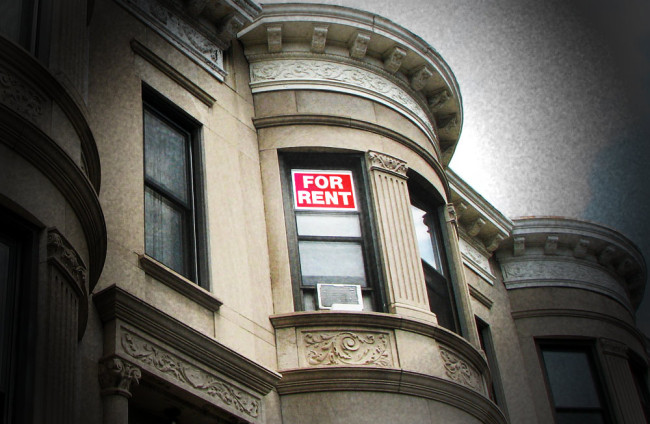When your landlord—or your tenant—is also your roommate
The relationship between landlord and tenant can be a contentious one: According to the Huffington Post, Internet search data reveals that landlords have a high negativity rating, and are viewed with more suspicion and dislike than even taxes and infidelity. Landlords, in turn, are no great fans of their tenants, associating them with words like “ungrateful,” “difficult,” and even “scumbag.”
It stands to reason, then, that a landlord and his or her tenant living under the same roof is an arrangement potentially fraught with disaster. The awkward dynamic between renter and landlord has long made for pop culture fodder from Ralph Furley's cringeworthy gay jokes at the expense of his tenant Jack on Three's Company, to the dastardly Benny from Rent who bought out the squat he'd previously been living in and then tried to shake down his former roommates for a year's worth of rent.
Nevertheless, many New York renters find themselves sharing a building—or even an apartment—with the property owner. An article in the New York Times explains that this is most often the case in small buildings in the outer boroughs, and that in such situations, privacy may take a hit, but there are advantages as well.
Brick spoke to New Yorkers who have lived in close quarters with their landlord or their tenant to get the lowdown on how to navigate this living arrangement without angst.
When you’re the landlord
For prospective buyers thinking long-term, purchasing a multi-family property—or even an apartment that’s larger than they need—and then renting it out may be a smart move. The expected rental earnings can be added to their income when they apply for a mortgage, as the Times lays out, which means they can buy more house than they would have otherwise. A previous Brick article outlines why multi-family homes make such good investments in NYC: In addition to rental income increasing your buying power, you can take tax deducations for your mortgage, plus any purchases you make for rental units can be written off as operating costs.
Taking on renters, though, also means shouldering new responsibilities by becoming the landlord. (Brick’s guide for first-time landlords reveals just how complicated this role can be.) So how can you assume the mantle of landlord peacefully?
Taking care when interviewing potential roommates is paramount, says Laura Wilson, who owns a two-bedroom apartment in the Bronx and has rented out the second bedroom to several people. Two out of the three who have rented from her were great to live with, she says, while one wasn’t the right fit and decided to move out after a trial period.
Wilson attributes her success in part to her openness to sharing her home. “I want my roommates to live in the full house,” she says. “It’s nice to have that family feeling, and have people to hang out with when I come home.”
Laying down clear ground rules—even with roommates who are already close friends, as two of Wilson’s renters have been—is also key. She’s allergic to fragrances, for instance, so she requests that roommates don’t spray perfume in the house; she also has a cat, and doesn’t allow additional pets. Wilson suggests that small landlords have their roommates sign a contract that officially lays out expectations and responsibilities to protect themselves and their property; she includes the aforementioned restrictions in hers, and notes that a benefit of being the landlord is being able to apply them.
And while her experiences have been largely positive ones, Wilson acknowledges there are definite risks in taking on tenants. “When I was renting with roommates, normal wear and tear didn’t bother me, but now, if they scratch the floor it will come out of my pocket when I’m selling the home,” she says. “Their security deposit will not even begin to cover it if there are damages.”
Wilson, in fact, has recently put her apartment on the market, which means that she and her current roommate are essentially living in a showroom. “We have to keep it looking like that all the time,” she says, noting that her tenant has been helpful and flexible as she has hosted open houses.
Todd Stevens, a broker with Douglas Elliman who is currently representing Wilson’s property, says that in many cases, the risks of taking on renters outweigh the potential benefits, because they could cause costly damages to your property, which will come back to bite you if and when you want to sell. “Any owner can lose 5 percent of the selling price of the apartment if they have bad roommates,” he notes, suggesting that if you have to have a tenant, it may be best to go with a family member or friend you trust to respect your home and belongings. And, he adds, "you should have a signed agreement even if it is a friend.”
This is why Wilson says that in the past, if she couldn’t find a tenant she felt comfortable with, she simply left the additional bedroom empty and took on paying the entire mortgage and maintenance fees herself. “Of course, it’s nicer to share expenses, but I also like to be good friends with my roommates,” she says. Still, “overall, it’s been a good experience for me.”
But being a landlord—even when your renter lives in another apartment—can still become a role that is demanding in ways you didn't anticipate. In a recent Brick podcast, a Manhattan brownstone owner who rents out units in her building recounted some of the tenant-induced angst she's experienced. Although she says that the majority of her tenants have been nice people, one's belligerence haunted her for years; "Any tiny problem, including a light out in the hallway... or a big snowfall that I got to ten minutes later than she wanted me to... anything became a call to the Department of Buildings as opposed to just a call to me," she recalls, which resulted in a stack of violations against her.
When you’re the tenant
Stephen Larkin, director at Relevance New York, fondly recalls the time he rented a floor of a Hell’s Kitchen townhouse from the landlady, who lived downstairs. “She was so cool,” he says. “She was a funny, vibrant woman who was an actress who had starred in soap operas, and she was very involved in the community.”
She was also a great landlord, Larkin says, who took excellent care of the property—which meant he had to be on top of his game, cleaning-wise: “She would be aghast at anybody who didn’t keep the apartment up.”
There were some drawbacks in terms of privacy, as well. Because the landlady worked from home, and her office was on the ground floor at the front of the home, she was privy to all of Larkin’s comings and goings. Furthermore, when he wanted to get a dog, she took quite a bit of persuading. “There was a trial period to see how the dog would behave,” he says. “A lot of times you can get away with more if the landlord isn’t in the building, but in this case I really had to convince her.” Fortunately, she ended up loving his pet.
Renters who share a home with their landlords are subject not only to their whims, but also to their lifestyle changes. At one point in his tenancy, Larkin remembers, his landlady got married. “Her husband was nice, but that shifted the energy a little bit,” he says. Eventually, the couple decided to sell the building, and Larkin had to move on.
Chad Dougatz, co-owner of recording studio Hangar Studios, had a much bumpier experience splitting a home with a landlord. “It was really a boundary-less existence for many years,” he says of his time living in the basement apartment of a two-family home in Astoria, where the landlord and his wife lived directly above him.
For starters, the apartment was illegal, and Dougatz was on the couple’s electrical system; because of this, they discouraged him from installing an air conditioner, though he eventually got one. Furthermore, the homeowners’ washer and dryer were in the hallway outside his place, and he would stumble across them doing laundry on his way in and out.
Privacy was a major issue for Dougatz, too: “I always felt like my parents were living above me,” he says. “For two months every summer they would go to Greece, and during that time I’d party like mom and dad were away.”
Ordinarily, having the homeowner nearby at least means a quick response when you need repairs or home maintenance, but Dougatz didn’t even enjoy this perk, as the landlord was quite elderly. In fact, he found himself taking on tasks that renters usually don’t have to handle, like shoveling snow and hauling trash to the sidewalk. Worst of all: “One day I heard a thud from upstairs—he had passed out,” Dougatz says. “At times I really felt like I had to take care of them.”
The experience convinced him to never live near a landlord again; in fact, Dougatz advises renters to get units as far away from the landlord’s as they can. Moreover, he was forever put off from the idea of buying a two-family home as an investment property. When it comes to the landlord-tenant relationship, “it’s best to have as low contact as possible, and ask for nothing,” Dougatz says.
You Might Also Like





























